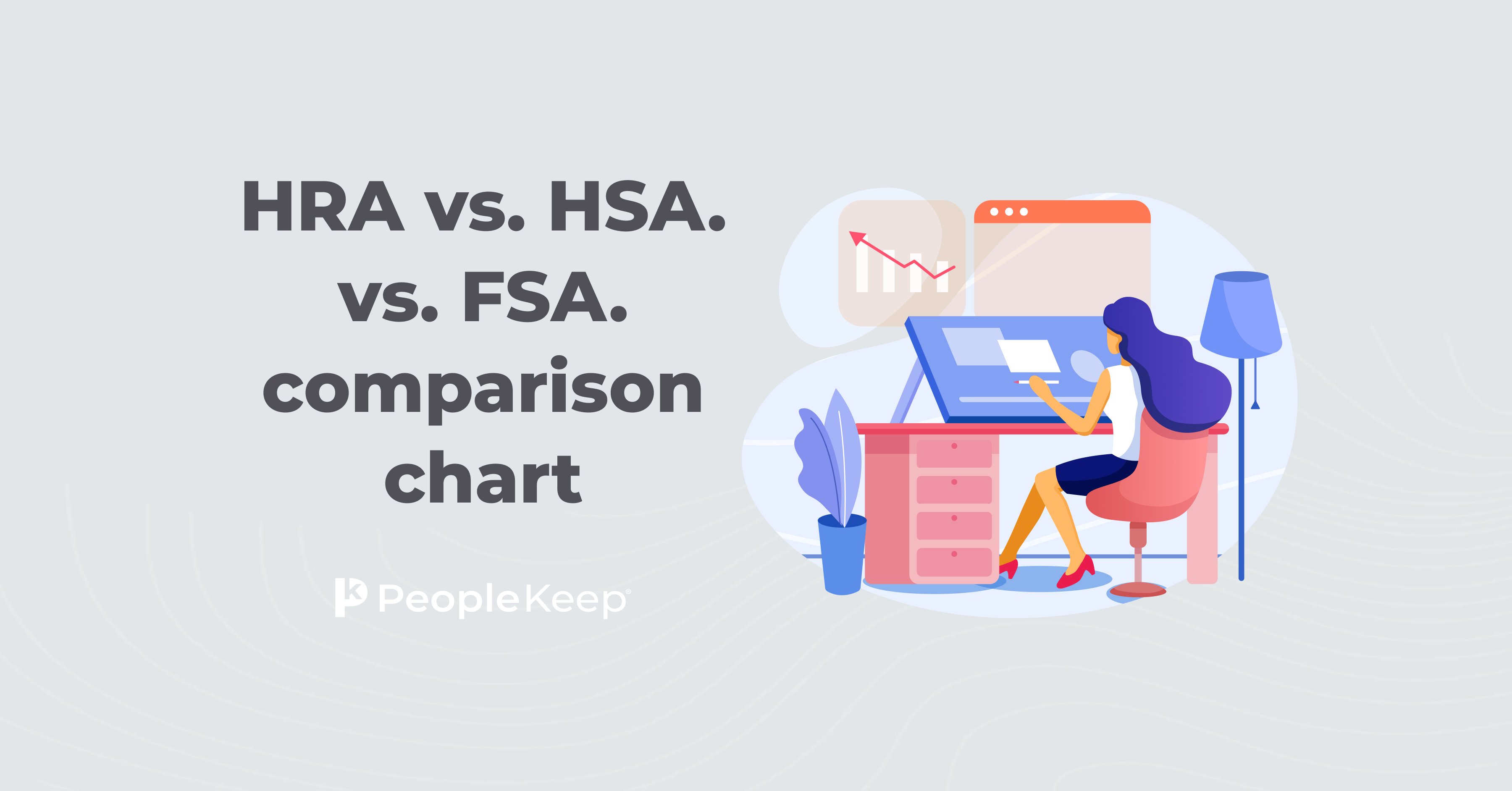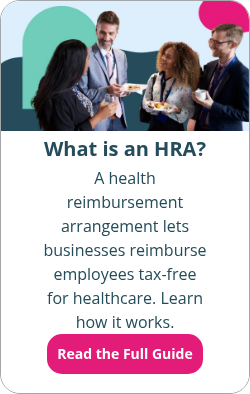Popular health insurance alternatives
By Holly Bengfort on April 25, 2024 at 9:35 AM
Small businesses often face challenges when providing health insurance for employees due to the high costs associated with traditional group health insurance plans. However, small businesses can consider several popular health insurance alternatives to provide their employees with access to healthcare coverage.
In this article, we'll explore some popular health insurance alternatives for small businesses that can help you provide your employees with the coverage they need without breaking the bank.
Takeaways from this blog post:
- Account based health plans like health reimbursement arrangements (HRAs) are more affordable alternatives to traditional group health insurance plans for small businesses.
- Health stipends and medical cost-sharing programs are other options for small businesses looking to provide health benefits to their employees without the high costs of traditional insurance plans.
- Offering health benefits shows dedication to employee well-being, which can help with retention and attracting top talent.
Health insurance alternatives for small businesses
While traditional health insurance plans are an option, they're not always the most feasible for small employers. Traditional plans often have hefty price tags, participation requirements, and annual rate hikes.
Small businesses can access small group health insurance plans and tax credits on the SHOP Marketplaces. However, these plans come with the same problems as other group plans.
If you want to avoid these issues altogether, you have five affordable health insurance alternatives to choose from.
Health reimbursement arrangements (HRAs)
One popular alternative for small businesses is offering health reimbursement arrangements (HRAs). With an HRA, employers can reimburse employees for more than 200 qualifying healthcare costs. Depending on the type of HRA an employer offers and how they design their benefit, this can include health insurance premiums and out-of-pocket medical care expenses. This allows small businesses to provide health benefits to their employees without having to pay for a traditional health insurance policy.
An HRA allows you to reimburse employees for a wide range of services and products, including:
- Monthly premiums for health insurance, vision, and dental coverage
- Prescription drugs
- Over-the-counter medicine
- Doctor visits
- Urgent care visits
- Preventive care services
- Pediatric care
- Dental care
- Vision care
- Chiropractic care
- Mental health counseling
With an HRA, employers offer a tax-free monthly allowance to their employees. Then, employees use their own money to pay for their medical care. Employees submit proof of purchase for their out-of-pocket costs to ensure compliance with IRS regulations. If the expense is eligible for reimbursement, the employer reimburses them up to their set allowance amount.
Two popular HRAs for small employers are:
- Qualified small employer HRA (QSEHRA): The QSEHRA is a popular health benefit for small businesses with fewer than 50 full-time equivalent employees (FTEs) that don’t offer a group plan. It allows employees to purchase individual health insurance policies or stay on a spouse’s or parent’s group plan. Companies can offer varying allowance amounts based on employee status, such as single or married. QSEHRAs have maximum annual contribution limits. Employees can receive tax-free reimbursements as long as they have minimum essential coverage (MEC).
- Individual coverage HRA (ICHRA): The ICHRA is similar to the QSEHRA but has fewer restrictions. The ICHRA allows employers of any size to offer different allowance amounts based on up to 11 employee classes, with no maximum contribution limits. However, employees must have a qualifying individual health insurance policy to participate. An ICHRA can also help organizations with 50 or more FTEs satisfy the ACA’s employer mandate.
Not only are HRAs an affordable alternative for coverage, but they also give your employees the flexibility they want when it comes to their healthcare. PeopleKeep's 2022 Employee Benefits Survey Report found that 65% of employees value being able to choose their own benefits.
With an ICHRA or a QSHERA, employees can purchase their own individual health insurance coverage through a federal or state health exchange or with the assistance of a broker. This allows them to choose a plan that aligns with their preferred primary care physician and overall provider network.
And because employers offer a set monthly allowance, their health benefit costs are predictable for the year. Costs only increase if the employer increases allowances the following plan year. If employees leave your organization, you can keep the remaining funds, contributing to greater savings over group plans.
Health stipends
Employers can also offer a health stipend to help employees afford their medical costs and health insurance premiums. A stipend is essentially extra money added to an employee's paycheck, so it counts as taxable income. However, you can’t ask employees to submit receipts or invoices to prove they spent their stipend on health care services. You also can’t ask employees for proof of coverage through a medical insurance plan.
A stipend doesn’t satisfy the ACA’s employer mandate for organizations with 50 or more FTEs.
Health savings accounts (HSAs)
Another health coverage option for small businesses is to offer a health savings account (HSA) paired with a high deductible health plan (HDHP). With an HSA, employees can contribute pre-tax funds to a savings account that they can use to pay for out-of-pocket expenses. By coupling an HSA with an HDHP, employees have access to a low-cost benefits option for catastrophic health issues while also having the ability to save for future medical expenses.
However, HSAs are not a total replacement for a group plan—instead, they allow employers to switch from a more expensive to a more affordable group policy without downgrading the value of their health benefit. Additionally, employees own their HSAs and can take their funds with them if they leave your organization. Employees also can’t use HSAs to pay for insurance premiums, while they can with a QSEHRA or ICHRA.
Medical cost-sharing program
Organizations such as churches and values-based nonprofits may also consider a healthcare sharing ministry program as an option for covering their employees' medical expenses. Members of these programs share similar beliefs and values, which guide how they distribute medical expenses. Each member contributes a fixed dollar amount to their own savings account each month. Then, when a community member is sick, they submit a request for the amount they need to cover their medical services.
Association health plans (AHP)
AHPs allow small businesses and self-employed individuals to team up and buy group health coverage to provide insurance for their employees.
AHPs are similar to traditional insurance plans, but the Affordable Care Act (ACA) doesn’t regulate them. This means that AHPs can increase premiums based on factors like age, health status, and gender. They can also choose not to cover treatment related to pre-existing conditions.
While AHPs offer cost savings, they don’t always provide the most comprehensive coverage for employees. For that reason, an HRA is a better option for employers who want to provide a quality health benefit that's still affordable.
Why should you offer a health benefit?
One illness can severely disrupt someone's life, which worries many Americans. According to KFF1, 74% of adults are worried about affording unexpected medical bills, and 73% are concerned about the cost of care for themselves and their families.
Health coverage offers your employees protection and peace of mind. Our 2022 Employee Benefits Survey Report found that 87% of employees value health benefits, such as health insurance. When employers choose to offer this popular benefit, it shows their dedication to the well-being of their team.
If you don't offer a health benefit as part of your compensation package, you'll have a hard time enticing job seekers to apply. Not to mention, your current employees may look for better opportunities elsewhere.
How can PeopleKeep help your small business?
If you want to offer a health insurance alternative, such as an HRA, PeopleKeep can help. We simplify the process of offering an HRA by conducting documentation reviews for all employee expenses, offering award-winning customer support, and generating federally required plan documents to ensure compliance and privacy. Our team is dedicated to handling the difficult tasks for you so you can concentrate on managing your business.
Conclusion
The high cost of health insurance makes it difficult for many small businesses to provide comprehensive health insurance benefits to their employee. As a result, many employers are turning to popular alternatives to health insurance to ensure their employees have access to quality healthcare. By exploring these options, small businesses can provide their employees with access to quality healthcare coverage while also managing costs effectively.
Check out more resources
See these related articles

HRA vs. HSA vs. FSA comparison chart
Confused about the differences between an HRA, HSA, and FSA? This comparison chart breaks down the key features of each health benefit option.

HRAs and S corporation owners
While S-corporation owners can't participate in HRAs, they can still be a good option to offer to employees instead of traditional group insurance.

What to do when your group health insurance premiums go up
Dealing with a health insurance premium increase? This guide has you covered with tips and strategies to navigate changes and keep your coverage affordable.



